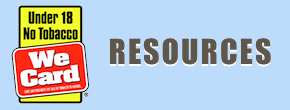
Wouldn’t it be great if there were just four steps to full compliance with FDA regulations governing regulated tobacco products?
For all the various FDA regulations, there are many steps necessary to comply. Training employees is certainly one of them.
However, FDA points out four “effective steps to prevent violations of the minimum age requirements for the sale of tobacco products.” They are:
-
Adopting and enforcing a written policy against sales to minors;
-
Informing employees of all applicable laws;
-
Establishing disciplinary sanctions for employee noncompliance; and
-
Requiring employees to verify age by way of photographic identification or electronic scanning device.
Additionally, FDA has indicated that a retailer’s implementation of these steps MUST be considered as factors in determining whether or not to impose FDA’s toughest penalty of a no-tobacco-sale order should your store receive one for repeated violations as a result of FDA compliance check inspections of your store.i
You should know that FDA is actively enforcing minimum age sales laws through compliance check inspections and has already conducted more than 508,000 checks of retail stores and is pursuing nearly 5,300 civil money penalties for violations. FDA also issued its first ever no-tobacco-sale order for stores with repeated violations. If your store hasn’t been inspected yet, it’s very likely to happen in the coming year.
So how do you go about incorporating these steps internally in your business operation at the store level?
The We Card Program has some suggestions and resources to help you make it happen. Let’s go through each one of the four steps:
-
Adopting and enforcing a written policy against sales to minors
We Card has a Company Tobacco Sales Policy & Employee Acknowledgement of Company Policy template that you can customize, put on your company letterhead and distribute to every employee. Consider using this as your starting point, add any additional tobacco sales policies you may already have, and get each employee to read and sign it and keep a copy in your employee files. It’s a free download at www.wecard.org in our Resource Center.
2) Informing employees of all applicable laws
Employees need to know not only what the federal law and FDA regulations require, but also what state laws require. The same goes for any local laws that may differ from the federal or state requirement. Here too, We Card has a resource for you – as free download at our Resource Center -- www.wecard.org. Go to We Card’s State Law Summaries where you’ll find the minimum-age requirement, the restricted products, the acceptable forms of ID, and if there is a government state sign requirement (and how to get one). For FDA requirements, be sure to see our summary – We Card’s Federal Law and FDA Regulations Summary. Download these resources, and use them to inform your employees. We also have an Employee Guide that you can purchase separately or as part of a We Card Renewal Kit or an e-Vapor Kit. These Guides provide a summary of state law, FDA regulations and tips on “carding.” State laws and FDA requirements are also incorporated fully into We Card’s online training.
 Get We Card's Guide to Best Practices -- an interactive PDF. To obtain the Guide, please complete our survey first.
Get We Card's Guide to Best Practices -- an interactive PDF. To obtain the Guide, please complete our survey first.
Take We Card Online Training -- an Employee Training Course is available with FDA content. Manager Training Course and a Refresher Training Course are available now.
ID Check-Up -- a confidential mystery shopping service to check your store's performance at carding customers.
We Card's Get Your Store Ready for FDA Enforcement
We Card's Federal Law and FDA Regulations summary
State Law Summaries Find out about the laws in your state -- including fines and penalties.
State Sign Requirement -- In some states, retailers are fined for not having the legally required signs posted. Find out what the sign looks like in your state.
Minor License Visual Characteristics -- Find out what the minor license in your state looks like.
Company Tobacco Sales Policy and Employee Acknowledgement of Company Policy -- We Card's recommended template you can use to customize for your company.
3) Establishing disciplinary sanctions for employee noncompliance
You determine how employees are disciplined if they fail a compliance check. We Card can provide support by encouraging you to consider re-training employees who do not perform properly and offers refresher training that should be taken on a regular basis. To provide balance, we also recommend that you reward employees who do perform properly – consider regular praise, recognition and other incentives to encourage compliance.
4) Requiring employees to verify age by way of photographic identifcation or electronic scanning device identification
FDA requires your employees to ask for ID of anyone under 27 years old who is attempting to purchase cigarettes, cigarette tobacco, smokeless tobacco or roll-your-own tobacco. There are no exceptions. FDA has indicated that even if a customer is known to be “of age” but under 27 years old, that customer must be carded each-and-every-time. The key word in this step is “verify.” We Card has tools to assist your sales associates with this verifying step as customers are asked for photographic identification. Our We Card Age of Purchase Calendar makes this step easier with the page-a-day calendar. You may also have a scanner or register age-prompt system for age-restricted products. Be sure to train employees to use it each-and-every time. And keep in mind that if FDA issues a citation to your store, you’ll actually receive two violations: one for selling to a minor and another for not asking for ID.
Follow these four steps to better position your store for compliance. And equip your store with in-store signage, including state required signs. These are helpful not just to alert your customers, but your employees as well – that carding is your policy.
Making sure your employees have the tools and training they need to keep you in compliance is good business.
The We Card Program is here as a resource for you and we are, of course, a strong advocate of comprehensive employee training. Drop by wecard.org and give our award winning training a try.
Doug Anderson
President
The We Card Program, Inc.
© 2015 Copyright - The We Card Program, Inc. All Rights Reserved.
Footnote:
i FDA Guidance: Civil Money Penalties and No-Tobacco Sale Orders for Tobacco Retailers, Responses to Frequently Asked Questions (Revised) May 2015. Accessed at: http://www.fda.gov/downloads/TobaccoProducts/Labeling/RulesRegulationsGuidance/UCM447310.pdf
What factors must FDA consider in determining whether to impose an NTSO and in determining whether to compromise, modify, or terminate such an order?
After FDA files the complaint, the respondent may present relevant factors for FDA to consider. Relevant factors are discussed below.
In determining the period to be covered by an NTSO or the amount of a CMP, FDA must take into account the nature, circumstances, extent, and gravity of the violations and, with respect to the violator, ability to pay, effect on ability to continue to do business, any history of prior such violations, the degree of culpability, and such other matters as justice may require (section 303(f)(5)(B) of the FD&C Act).
In determining whether to impose an NTSO, or whether to compromise, modify, or terminate an NTSO, FDA must consider whether a retailer has taken the effective steps to prevent violations of the minimum age requirements for the sale of tobacco products, including
• adopting and enforcing a written policy against sales to minors;
• informing its employees of all applicable laws;
• establishing disciplinary sanctions for employee noncompliance; and
• requiring its employees to verify age by way of photographic identification or electronic scanning device.
Section 103(q)(1)(G) of the Tobacco Control Act.





